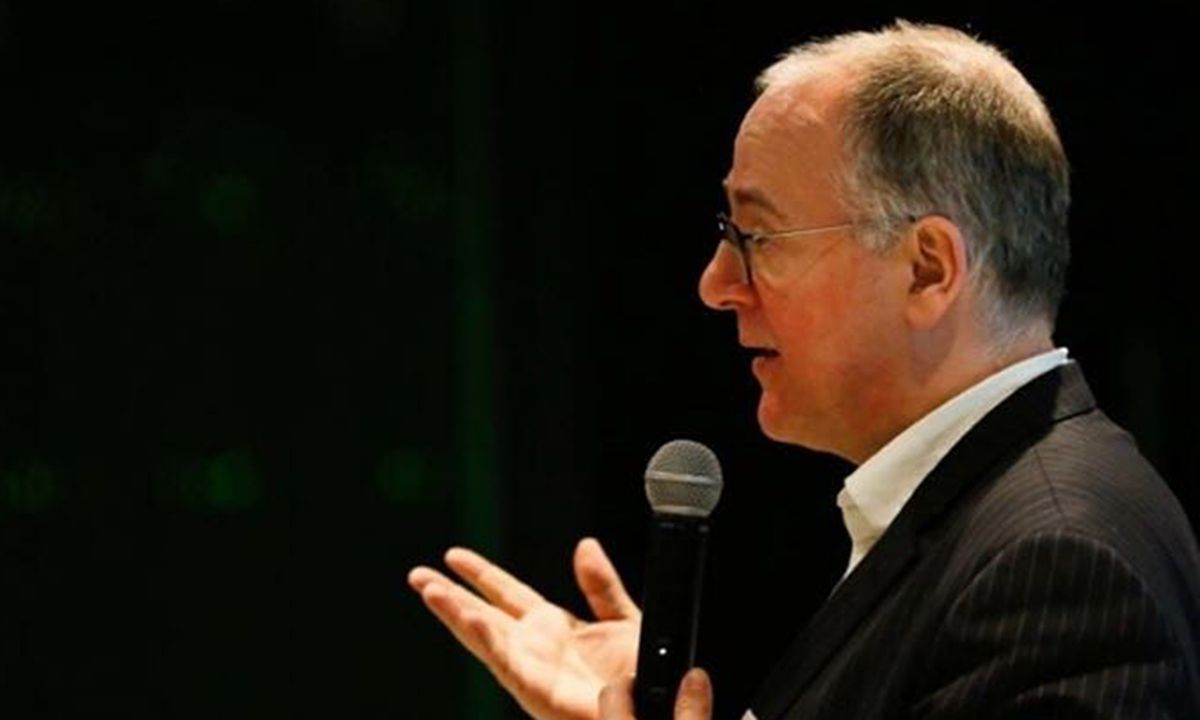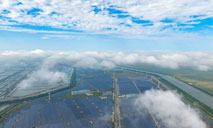Westerners need to adapt to China’s influence

Kerry Brown Photo: Courtesy of Kerry Brown
Editor's Note:
The West and China "need to have a forum for learning, that is a two-way process." Kerry Brown, director of the Lau Institute at King's College London, believes that there are many lessons from China that the world can draw on. Why does Brown hold such an observation? What are some ways Western countries can view their relations with a peacefully rising China? Why do dialogues between Western countries and China always seem difficult? Brown shared his opinions on these issues with Global Times (GT) reporter Sun Wei.
GT: How many years have you been studying China? How many researchers does the Lau China Institute at King's College, London currently have? Could you talk about your recent research topics or your upcoming book?
Brown: I first visited China in 1991, 30 years ago. I started studying Mandarin [Putonghua] in Melbourne, Australia in 1992, and then undertook a postgraduate degree in it in 1993. The Lau Institute has currently six full-time academic staff. These are people the institute directly funds. Most other similar institutes have affiliates. So we are pretty unique. We also have 30 doctoral students, and usually about 40 masters students each year. Currently, I am working on an annotated selection of the key works of major European thinkers on China since the time of Marco Polo to the 1970s - people like Voltaire, Montesquieu, Leibniz, Marx, Hegel, Weber, Russell, Kristeva and Barthes. This will be published later this year.
GT: British Prime Minister Boris Johnson recently said he wants more business deals with China, and warned that a cold war with China would be a "mistake." PM's father Stanley urged him to "stand up" to Tory hawks, saying post-Brexit UK must work "even closer" with China. What's the public view in general? Do they oppose or worry about the so-called new cold war?
Brown: British public opinion to China historically has never been either that warm or that hostile. Until COVID-19 most people probably didn't think much about China and any role it might play in their lives. Of course, with the pandemic, and the arguments over virus spread, management, and so on, China has become of more interest to politicians, commentators, and a wide range of different people. It is good there is wider interest in China, but not so good that it is often people with the most extreme views and the loudest impression of being certain despite having little to go on in terms of real experience have found a platform. I sometimes feel nostalgic for the time when China was a less hot topic in the UK!
GT: China had had golden relationship with the UK, Germany, France and so on, but there has been a lot of turbulence in recent years. Why there are so many back and forth moves? What is the reason that the dialogue between Western countries and China always seems difficult?
Brown: This is why I decided to gather the ideas of key thinkers from European history like Leibniz and Voltaire, Hegel and Marx on China. In many ways they are symptomatic of the kinds of structural issues we still see today. Broadly, the Leibniz school is seeking a sort of objectivity - to try to set aside our own convictions and proclivities and see China "scientifically." For Voltaire, there was an attitude verging on worship of a China he knew only remotely and idealized. This was more about his own disillusionment with the politics of 18th-century Europe. For Montesquieu, China was negative - despotic and backward. In many ways, that same division still exists in Europe today. Social media with its deadly ability to decontextualize things and remove nuance hasn't helped. I really wonder how things would be if we had all the same issues between China and Europe as we do now, but no social media in Chinese or English (or other European languages). Surely things would have been better in some respects, at least in terms of the quality of our respective discourse towards each other.
GT: In a recent dialogue with the Beijing-based Center for China and Globalization, you said, the US and Europe "were going to China to teach to show how you do things. I think that we need to kind of have some recognition that there are many things where China can come to the rest of the world and teach and show how you can do." Why did you have such an observation, and what kinds of governance experience can the US and Europe use for reference?
Brown: Clearly there are things that China has achieved in terms of developing improved livelihood for a large number of its citizens, and building infrastructure, that it can [teach], and has been teaching to other countries. My point was that the European habit of always wanting to be the explainer and teacher (and I acknowledge, I am as prone to this as anyone else!) needs to change now. Yes, there are many areas where Europe is still strong in terms of knowledge production. But there are an increasing number of areas where China can teach Europe things - environmental science is one. We need to be open to this.
GT: European countries have recently been caught up with the third wave of the coronavirus. How would you compare China's anti-epidemic measures with those of Europe and the US?
Brown: The measures China introduced were effective, of course. But European governments assessed that the social and political costs of implementing measures like these in Europe were too high. That meant they had to use different means, with far messier outcomes. Europeans are not happy with the huge suite of powers that their governments have assumed to deal with the pandemic, and would want these removed as soon as the pandemic recedes. We have all learned that different assessments of how to deal with a pandemic and what public tolerance for these are have occurred across the world. There is no easy conclusion to draw though; some democracies have done very well in combating the pandemic too. This really has been a searing learning process. We all need to be a bit more humble at the moment - and that includes everyone.
GT: This year marks the beginning of China's 14th Five-Year Plan (2021-25) that was launched at the country's most recent two sessions. In the next five years, what kind of challenges might China face? This year also marks the 100th anniversary of the founding of the Communist Party of China. How do you evaluate the changes in China in the past 100 years?
Brown: Of course, they have been simply immense. It is often forgotten, but in 1920 in terms of life expectancy, health, public living standards, China was a wholly different place than that which exists today. It has been on an immense journey. People in Europe are prone to feel that the world in 2021 is getting worse. But in fact, on almost every measure, things are improving in terms of reduction of poverty, disease, well-being, and this is largely due to the achievements in China, India and across Africa.
For the challenges facing China, the main one will be how to find its proper international space when of course its values and attitude towards the prevailing international system are different. This is due to its own history and culture, and the speed of its rise, which have been as disorientating for it as they have for the outside world, and pose many challenges about what sort of space China wants, what the world wants from China, and how best to try to create a balanced, viable and sustainable system that can accommodate these different pressures and approaches.
For China's domestic development, the main thing is to maintain sustainably the current speed of improvements in people's material lives in ways which continue to reach people's expectations without creating frustration and dissatisfaction if there are pauses, or challenges, to this attempt. China needs to deal with vast environmental issues, and it is good that it is working with the wider world in trying to answer some of these.

Kerry Brown Photo: Courtesy of Kerry Brown
GT: Have you ever been to the less-developed areas in China? If so, what impression did China's poverty reduction work leave on you?
Brown: One of the standard attack points some people make when one comments on China if based abroad is that of course, this is from the comfortable vantage point of only occasionally visiting, and usually staying in nice, air conditioned hotels in nice places! It is a truly facile point. Since the mid-1990s, I stayed in plenty of different places. I traveled extensively to very rural areas in Inner Mongolia, basically from 1994 onward. I traveled around Xinjiang for six weeks in 1995 - and indeed even as a diplomat often ended up in quite rural places. The thing is that the countryside as a place of lack of development and backwardness slowly receded over this time. One often ended up in places which said they were rural, but looked like small towns or cities. In the late 2000s I did a project on village democracy and went to a village near Beijing in Hebei Province. Even then, it was clear that the countryside was transforming. China is a very different place now. It is likelier that if I do stay in air conditioned hotels, they will be in the countryside - and I will have to turn the air conditioning off because of the noise it makes at night!
GT: China is a middle-income country with uneven development. However, there are heated discussions about China going on its way to overtake the US to become the world's biggest economy. What does this mean?
Brown: Its main meaning is psychological. It will mean that one day in the next decade, we will go to sleep in a world where America is economically No.1 in gross terms, and wake up the next day in one where China has supplanted it. Even if in many, many other areas, America will still be dominant, at least for this measurement, China will have status. That will have enormous symbolic meaning.
GT: You said you don't believe in the "Thucydides's trap." Why? After experiencing the US-China frictions during the Trump era and the series of positions expressed by the Biden administration toward China, what's your view about the future of US-China relations? Are you optimistic or not?
Brown: I am not a Marxist. I don't believe in historic inevitability. But I am a realist. And the fact is that China will play a growing role in the world, and no one will change that. It presents many challenges and many problems, I know. It is not at all what people were probably expecting, even two decades ago. But we have to deal with it. China cannot be pushed back behind some virtual great wall. It cannot be told to just stay in its subsidiary place. Even the Chinese government can't tell its people to do that. The worst thing we could do is to try to manage this moment of great change by sticking our heads in the sand and pretending it isn't happening.
GT: In the post-pandemic era, what changes do you think may happen to the international order? How should China deal with the new waves of "China threat" hype among Western politicians?
Brown: People talk about decoupling. I don't think decoupling economically, or geopolitically, works. But I do have a modest proposal. I think in terms of social media, and other platforms, there should be a kind of decoupling. In fights on social media, no one ever comes off looking good, and I am a bit surprised that there are so many official Chinese using Twitter in particular. I think the Chinese government and its spokespeople should just boycott Twitter. There is no way an issue as complex and nuanced as that around China-US relations can ever have justice done to them on a platform like this. Sometimes, it is best just to be silent. That's why I use the mute button so much. China and the US should sometimes do the same.
For the post-pandemic international order, there needs to be more knowledge sharing about how to deal with public health issues, and more investment in these. China has a role to play here. It would be a great pity if politics, on all sides, were to stop that very necessary cooperation.
Photos
Related Stories
- Brazil needs to resolve diplomat issues with China for COVID-19 vaccine: Sao Paulo governor
- Feature: An Australian scholar's happy memories of China
- Chinese citizens' trust in government rises to 98 percent: Survey
- DRC president hails mining, infrastructure cooperation with China
- China succeeds in first Mars landing
Copyright © 2021 People's Daily Online. All Rights Reserved.










